Remove Stains From Granite With The Official Granite Stain Removal Guide
Can stains be removed from granite? Absolutely. And the following information will show you how to remove stains from granite and other natural stones. If your granite countertops weren’t properly sealed, you risk the chance of a stain in your granite.
In fact, granite stains can have several different sources such as food, chemicals, oil, ink, water marks, rust. But, if you unfortunately discover you have a stain in your stone countertops, don’t fret. You have proven methods to remove stains from granite and other natural stones, many times with great results.
For granite stain removal and all other natural stone and quartz care, I promote mostly MB Stone Care products. Actually, my experience in the granite industry allowed me to meet the founder of MB Stone 20 years ago. In fact, I’ve been using and promoting MB Stone products for 21 years now!
Here’s How To Clean Badly Stained Grout
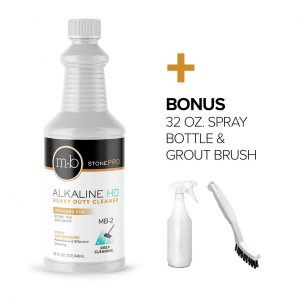 For hard to clean grout, try MB2 Alkaline Heavy Duty Cleaner Kit. This is specially formulated to clean the toughest stains. The kit comes with a spray bottle and grout brush. Easy Oxy multi-surface cleaner is also recommended for grout cleaning. It’s a biodegradable, eco-friendly cleaner for granite and natural stone. Check out my latest video – Best Way To Clean Stained Grout.
For hard to clean grout, try MB2 Alkaline Heavy Duty Cleaner Kit. This is specially formulated to clean the toughest stains. The kit comes with a spray bottle and grout brush. Easy Oxy multi-surface cleaner is also recommended for grout cleaning. It’s a biodegradable, eco-friendly cleaner for granite and natural stone. Check out my latest video – Best Way To Clean Stained Grout.
How To Get Stains Out Of Quartz Countertops
Quartz countertops or engineered stone tops have their own stain removal considerations different than granite and natural stone. It’s true, the nature of quartz worktops, like Silestone and Caesarstone, prevents penetrating stains. However, you can definitely get surface stains. See Quartz Countertop Maintenance for precautions, routine cleaning, and stain removal tips.
Granite Stain Removal Guide
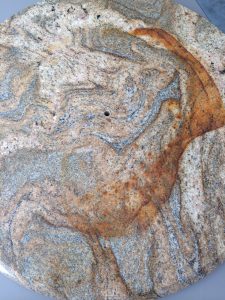
Here’s the granite stain removal guide with proven directions to restore your granite countertops to their original beauty. Included are instructions for stain removal from granite, marble, onyx, limestone, and other natural stones.
However, to prevent stains in the first place, properly seal your granite and follow some simple granite care directions. Here’s how to clean and care for granite countertops. If you get a stain, here’s what you should do . . .
Spills on granite and other natural stones
If you spill a staining substance on your countertops, blot immediately with a paper towel. Do not wipe the area, as this will only spread the spill. Next, clean the area with mild soap and water, rinsing several times. Then dry with a soft cloth and repeat if needed. However, if you do get a stain, follow this guide. Seal granite countertops with a 3 to 5 year sealer line MB-24 Barrier or a recommended permanent granite sealer like MB-21 Color Enhancer & Sealer.
So here’s what you should know about granite staining culprits and actions to take to remove stains from granite.
How To Remove Stains From Granite – Step by Step Instructions
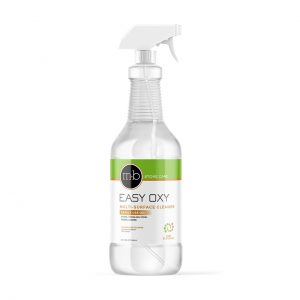 The first and easiest step to remove stains in granite and natural stone tops is to a commercially available stain cleaner made for stone. An oxygenated, non-bleach cleaner like Easy Oxy works on all hard surfaces. It can remove food stains, red wine stains, grease, ink, blood, and cosmetic stains.
The first and easiest step to remove stains in granite and natural stone tops is to a commercially available stain cleaner made for stone. An oxygenated, non-bleach cleaner like Easy Oxy works on all hard surfaces. It can remove food stains, red wine stains, grease, ink, blood, and cosmetic stains.
Removing stains with Easy Oxy is as easy as spray on and wipe off. However, for tougher stains, spray the area and let the product sit for a few minutes. Then wipe away.
If Easy Oxy doesn’t get the job done, here are recommended granite stain removal techniques based on the type of stain.
Get Out Oil Stains On Granite Counters
An oil-based stain will darken your stone counter and usually needs to be chemically dissolved.
Get rid of granite stains by cleaning gently with a soft, liquid cleanser with bleach OR household detergent OR ammonia OR acetone OR mineral spirits. (DO NOT MIX THESE AGENTS! Combining ammonia and bleach, for example, creates a lethal gas!)
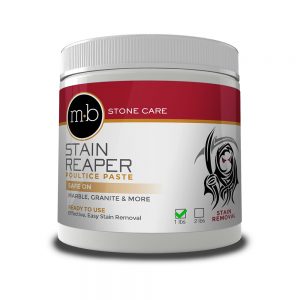 I’ve had much success cleaning oil stains using Dawn brand dishwashing soap, washing and drying the area repeatedly. However, Stain Reaper from MB Stone is a simple, pre-mixed solution that really gets out granite stains.
I’ve had much success cleaning oil stains using Dawn brand dishwashing soap, washing and drying the area repeatedly. However, Stain Reaper from MB Stone is a simple, pre-mixed solution that really gets out granite stains.
Straight acetone has also removed most oil stains. Acetone may require multiple cleanings depending on how deep the oil has penetrated. Wear gloves and keep in mind that the acetone evaporates rapidly.
Stain Reaper from MB Stone Care is probably the easiest option for granite stain removal. Tested to work, easy to apply, get it here – recommended granite stain removal poultice.
ORGANIC STAIN
(leaves, fruit, coffee, food, paper, urine, tobacco)
Organic sources can cause a pinkish-brown stain that can actually disappear after you remove the source.
Clean stains with hair-bleaching strength hydrogen peroxide (12%) and a few drops of ammonia.
How to Remove a Rust Stain From Granite
METAL STAIN (rust, copper, bronze)
Rust or iron stains are orange to brown in color and typically are in the shape of the stain-causing object. Bronze and copper stains may look green or brown. Metal stains require a poultice for removal. See How to use a poultice for stain removal below.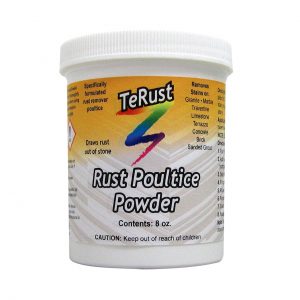
TeRust rust poultice powder from Tenax is a recommended granite rust stain remover. In fact, it’s formulated specifically for rust stains in stone countertops.
BIOLOGICAL STAIN (mildew, algae, moss, mildew, fungi)
Clean with diluted ammonia OR bleach OR hydrogen peroxide. (1/2 cup cleaning agent in a gallon of water) DO NOT MIX BLEACH AND AMMONIA WHICH PRODUCES A TOXIC AND LETHAL GAS! Also, as an eco-friendly mold & mildew remover, MB Stone makes MB-9. It’s biodegradable, fast acting, and does not require scrubbing.
To remove biological stains (mold, mildew, algae, lichens) on outdoor stone, concrete, or wood, try D/2 Biological Solution. D/2 is a biodegradable, non-toxic, no bleach product that does not require scrubbing. Environmentally friendly, green stain removal solution for outdoor granite, stone, or concrete counters.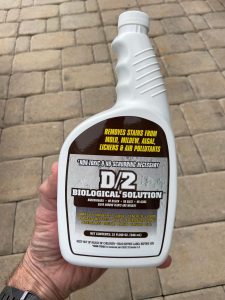
INK STAIN (pen, ink, Sharpie)
On light colored stones such as Madura Gold or Giallo, clean with bleach OR hydrogen peroxide. Do not use bleach or hydrogen peroxide on darker stones for fear of bleaching out color. On darker stones, try a solvent like lacquer thinner or acetone.
How To Get Out Paint Stains In Granite
Typically, latex or acrylic paints won’t cause a stain. Oil based paints, caulk, putty, preservative oils, and sealants may cause oil stains.
For small paint stains, you can remove stains from granite with lacquer thinner or scrape off with a razor knife. A heavy paint spill will require commercial paint stripper. These strippers may contain lye or caustic soda and can “etch” your stone surface.
Follow the manufacturer’s directions and be sure to flush the cleaned area thoroughly with water. Wear rubber gloves and eye protection! Make sure the area is well ventilated too.
WATER STAINS ON GRANITE
Removing water stains on granite is actually removing the agent that is causing an artificial stain to appear.
Often water stains are rings appearing “in the granite sealer” (especially on black granite). Remove the stain by removing the sealer with denatured alcohol. Simply spray it on and rub in circles with a clean cloth, changing the area of the cloth you are using frequently.
Repeat this several times but do it quickly, as the alcohol evaporates fast.
NICKS & SCRATCHES ON STONE
Surface scratches can be buffed with dry 0000 steel wool. It really depends on the hardness of the stone for steel wool to have any effect. See Granite Repair for deeper scratches or chips.
Clean the area with mild soap and water, rinsing several times. Then dry with a soft cloth and repeat if needed.
How to use a poultice to remove stains from granite
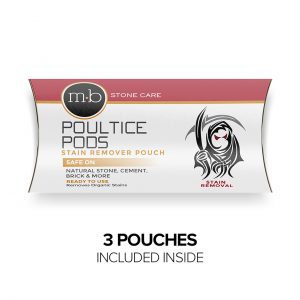 Some granite stains are so strong or “set in” that they require removal using a poultice. A poultice consists of a cleaning agent combined with a stain absorbing agent. The two recommended agents are mixed to form a paste. The paste is applied to the granite stain or marble stain and allowed to dry for 24 – 48 hours.
Some granite stains are so strong or “set in” that they require removal using a poultice. A poultice consists of a cleaning agent combined with a stain absorbing agent. The two recommended agents are mixed to form a paste. The paste is applied to the granite stain or marble stain and allowed to dry for 24 – 48 hours.
Absorbing agents to use with a poultice
Poultice materials can be either diatomaceous earth, kaolin, talc, white molding plaster or powdered chalk. 16 oz. of prepared poultice material should cover about 1 square foot of area. You can also try using gauze pads, white paper towels or white cotton balls.
Poultice combinations by granite stain type
OIL BASED STAINS – Use a poultice made with baking soda and water OR one of the absorbing agents and mineral spirits.
ORGANIC STAINS – Use a poultice made with one of the absorbing agents and 12% hydrogen peroxide OR replace the hydrogen peroxide with acetone.
IRON STAINS – Use a poultice made with diatomaceous earth and a commercially available rust remover. Rust stains are probably the most difficult stains to remove.
COPPER STAINS – Use a poultice made with one of the absorbing agents and ammonia.
BIOLOGICAL STAINS – Use a poultice made with an absorbing agent and dilute ammonia OR bleach OR hydrogen peroxide. However, DO NOT MIX BLEACH AND AMMONIA! THIS COMBINATION PRODUCES A TOXIC AND LETHAL GAS!
Apply The Poultice
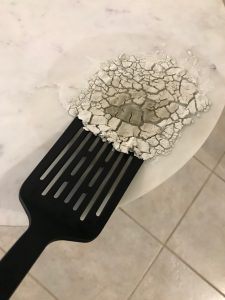 To prepare the poultice, mix the cleaning agent with a powdered absorbing agent to form a thick paste the consistency of peanut butter. If using paper, soak it in the liquid cleaning agent and let drain. Then, wet the stained area with distilled water.
To prepare the poultice, mix the cleaning agent with a powdered absorbing agent to form a thick paste the consistency of peanut butter. If using paper, soak it in the liquid cleaning agent and let drain. Then, wet the stained area with distilled water.
Apply the poultice to the stained area about ½ inch thick, extending the poultice material beyond the stained area by approximately one inch. Use a putty knife or wood shim to spread the poultice evenly. Cover the poultice with plastic and tape the edges to seal it. And leave the poultice covered for roughly 24 hours.
After about 24 hours, remove the plastic and allow the poultice to dry for another 24 hours which actually draws the stain into the poultice.
Finally, lift the poultice from the stain using a wood or plastic scraper and rinse the area with distilled water and buff dry with a soft cloth. Repeat the poultice application if the stain is not removed. I have seen some really tough stains take up to 5 applications of a poultice. You can order Stain Reaper marble and granite stain remover direct from the manufacturer.
Soap Film On Granite & Natural Stone Countertops
Good news is, you can restore the shine on granite countertops with MB-3 Soap Film Remover. Simply dilute some MB-3 with water and wash away soap film. This will return the shine to your granite tops. Check out all the recommended granite and marble maintenance products from MB Stone.
Granite Stain Removal Products
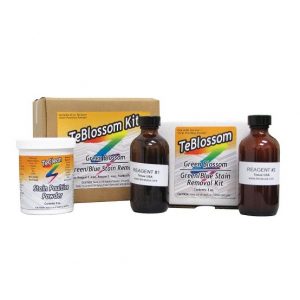
How to protect new home surfaces from stains
Return from granite stain removal to Granite Care Home